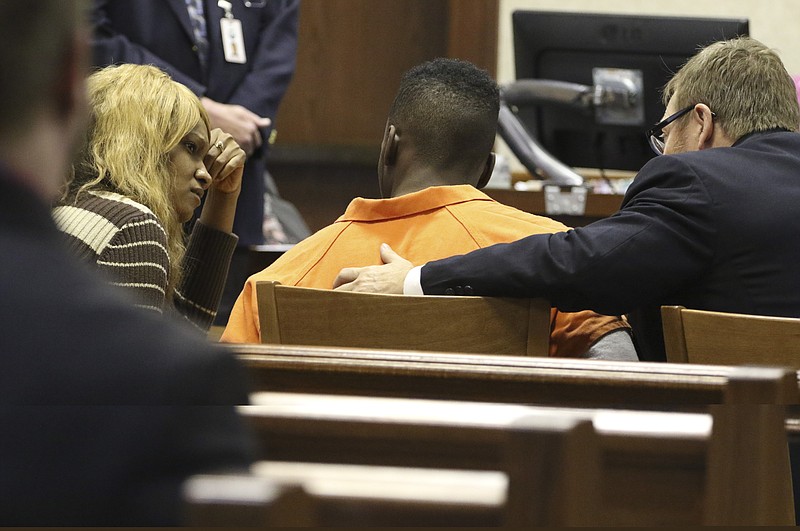JUVENILES SHOT IN CHATTANOOGA
Number of shooting victims age 17 or younger, does not include suicides2016: 17 (1 accidental)2015: 13 (1 accidental)2014: 172013: 23 (1 accidental)Source: Chattanooga Police Department
JUVENILES SHOT IN CHATTANOOGA BY AGE, 2013-2016
2 or younger: 83-10: 311-14: 515-17: 54Source: Chattanooga Police Department
Seventy juveniles have been shot in Chattanooga during the past four years, and police say only three of the shootings were unintentional.
Most of the children and teenagers, none older than 17, were shot as part of intentional violence, although they were not necessarily the intended targets of that violence.
A 22-month-old baby was shot in the leg while on the porch of his home in Athens Park in August. A 7-year-old boy and 15-year-old boy were both shot during a drive-by shooting on Daisy Street in July. In June 2015, two 4-year-old girls playing in a yard were wounded when someone opened fire from a passing vehicle. In January that year, a 1-year-old girl was paralyzed from the chest down in a shooting.
Six of the 70 children who were shot died, including the only juvenile shot and killed in 2016, 17-year-old Ladarius Bush. Most victims were between 15 and 17 years old, with those ages making up 77 percent of all juvenile shooting victims between 2013 and 2016, according to police.
The next largest percentage was children under the age of three, with eight victims making up 11 percent of all juvenile victims. None of those eight shootings were unintentional.
On Wednesday, a group of physicians, educators, community members and police officers gathered at T.C. Thompson Children's Hospital at Erlanger to discuss patterns of gun injuries involving minors and what can be done to slow the pace of children wounded by gunfire.
Dr. Dave Bhattacharya, a pediatric surgeon at Children's Hospital, guided the packed room through research that shows that black children in Tennessee are four times more likely to die from a gunshot wound than white children. Also, the risk of a child being shot intentionally increases dramatically after age 13, and children in poor socioeconomic areas face a higher risk of being shot.
Bhattacharya suggested Erlanger's pediatricians should ask parents about gun ownership during children's annual checkups and give information on safe firearm practices to parents who keep guns in their homes.
"'Is your child immunized? Does your child wear a seat belt? And do you have a firearm in your home?'" he said. "I think those questions all go together."
Every doctor should have the right to ask questions about firearms just as they might ask about swimming pools, safety gates or car seats, said Kathleen Chandler Wright, a member of the Tennessee chapter of the Moms Demand Action for Gun Sense in America.
"It's not about whether you can have a gun, it's, 'Hey, if you have one, store it safely: unloaded, locked up and separate from the ammunition,'" she said.
Yet while such steps might help address unintentional shootings, nearly all of the children shot in Chattanooga during the last four years were wounded during intentional acts of violence.
That's a whole other beast, officials at the meeting said.
"We've thought for years that this is a public health issue as much as anything," police Chief Fred Fletcher said. "There are a lot of underlying issues that have nothing to do with criminal justice: poverty, density, culture, social media."
Gang members were involved in 61 percent of the 132 shootings Chattanooga saw in 2016, according to police, and much of that gang violence was driven by young teenage shooters. Social media has raised the stakes among young shooters, Sgt. Josh May said, and often, victims of shootings are also pulling the trigger.
"What used to be the physical playground when we were growing up is now social media," May said. "It's how crazy can you get on Facebook, Instagram, Twitter. From challenges to just showing guns, threatening one another a lot of these kids really think they're invincible, like we did when we were young."
During Wednesday's meeting, doctors and other participants suggested a wide range of approaches to stem intentional juvenile shootings, from increased mentoring to school lessons about the gory reality of gunshot wounds.
For Chandler Wright, one part of the problem - minors having access to guns - circles back to adult responsibility.
"If the person who is shooting is under the age of 18, legally they should not have access to a gun," she said. "So, ultimately, at the end of the day that means they were able to access a firearm from an adult, whether it's stolen or a straw purchase or what. Ultimately, adults should be responsible so a teenager who is angry or in a gang can't get access to [a firearm]."
Juveniles under the age of 18 are prohibited from owning or possessing guns in Tennessee, with a handful of exceptions for hunting, safety courses or instruction.
Most people at Erlanger on Wednesday seemed to agree any real solution to Chattanooga's juvenile shootings will require a combined effort among schools, doctors, law enforcement and community leaders.
"We can have meeting after meeting after meeting," said Troy Rogers, the city's public safety coordinator. "Until you commit your time, until you get in front of those kids and invest your personal space, we're going to be meeting again. You've got to be involved and in front of them."
Contact staff writer Shelly Bradbury at 423-757-6525 or sbradbury@timesfreepress.com with tips or story ideas. Follow @ShellyBradbury.

